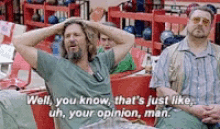The Squash, The Squeeze and All the Small Things He ‘Doesn’t’ Say
What you have to understand about Rishi Sunak is that he’s a very Macavity-like figure in Whitehall that subtly drifts between departments like some kind of amorphous, foreboding and sinister fog complete with ominous synth-bass notes.
He’s a remarkably insidious presence, too - where the Prime Minister may enjoy the notoriety and the bombast, Sunak is more businessman-like and managerial; part-investor, almost-Presidential, a mostly narcissistic techie and self-confessed “total coke addict” - and working behind the scenes, just occasionally popping out of the long grass, like a reptile, to post an ‘Insta’ featuring him slithering around the Treasury office in £95 Palm Angel flip-flops or drinking from a £180 coffee mug - and both times before a major budget announcement almost as though it’s a bat-signal to free market capitalists.
It’s all bullshit, of course - this ‘Brand Rishi’
Those proclaiming him to be the “greatest chancellor ever” are more like consumerist zombies that have fallen for ‘the event’ of ‘Brand Rishi’ - not unlike the antagonists from ‘Dawn of the Dead’ wandering around aimlessly and operating on pure instinct to the sound of ‘The Gonk’.
And they ‘don’t know why,’ these Sunak supporters - they can’t really explain why Sunak is the “greatest chancellor ever” - something about furlough, or other; scrutiny on policy is very seldom seen - Sunak just seems ‘special’ to them, like an event, and so they just turn up without any reason for being there. And consume. And that’s the point.
Spending Spree?
It’s all about the fine-print and what isn’t being said.
Sunak’s attention to the fineprint is clinically arranged - like his image, pieced together and carefully contrived by his own Dominic Cummings-approved in-house PR unit - but that isn’t to assume that what he says makes fiscal sense.
Broadly speaking, what the Chancellor’s budget reveals is that austerity between 2010-present was an entirely political choice. An avoidable one, too.
We could talk about all the details - and those that actually affect people's daily lives and how much ‘better’ their lives are going to be under Sunak’s watchful gaze.
What’s interesting is how that term ‘better off’ [Sunak hopes] will manifest itself.
You can read Sunak’s budget here
The papers this morning state that Sunak is on a spending spree, and somehow we should be grateful for this - that we’ll be ‘better off’ as a result.
Actually, you’d find parallels in how it might be seen as ‘a spending spree’ by how Sunak perceives the UK’s growth, which he says is the fastest growing in the G7.
It is true, it is the fastest growing, but only because we started from the lowest base - and so any growth will be perceived as positive.
Likewise with austerity, if you deprive a council like Leeds, for example, of £251 Million, and then churlishly venture to Twitter to tell its MP [in this case Leeds’ own Rachel Reeves] that you’ve given them back £20 million to ‘level up’ transport connections, naturally, you start to ask whether that compensates for what has been lost [or taken away] over the years.
Sunak did this with Doncaster, too - Leicester and Sunderland as well - and yet each respective constituency has suffered as a consequence of Conservative austerity.
Rachel Reeves told ITV that Sunak's tweet pledging £20 Million for Transport Connections in her constituency is not actually going to Reeves' constituency but that belonging to Conservative MP Stuart Andrew in neighbouring Pudsey.
Reeves suggested that, “Perhaps for Christmas somebody should buy him an A-Z…so he can work out where he is in the country.”
This follows Sunak's appearance on BBC News where he revealed [twice] that he was in the "world famous" Burnley, much to the surprise of all watching keen to remind the chancellor that he was, in fact, in Bury.
This said, however, Conservative constituency or otherwise, spending sprees can only be perceived as spending sprees because for the last 11 years, the Conservatives have been so miserly.
Like the UK’s growth, any funding will be seen as a positive when you start from the lowest base.
But it’s about what people ‘feel’ - isn’t it?
Hopes and optimism, Sunak says, taking a page out of Reagan/Johnson’s laminated book of dreams, but that doesn’t necessarily equate to people actually ‘being’ happier or better off.
Not Better Off
Paul Johnson, director of the IFS, appeared to be most scathing.
His analysis was, as he told the BBC, “Over the next four or five years I’m afraid on average we’re barely going to see any improvement in our living standards” - and like this page, he reflects on the damage caused by austerity.
Johnson notes, too, that “Rising inflation and rising taxes offset higher earnings and employment.”
On inflation, whatever meagre rises to the National Living Wage provided by Sunak will not accommodate actual cost of living, and will squeeze the poorest the hardest when translated into the amount they pay for goods, utility bills, and even food in the long-term.
At least based on OBR analysis in years to come.
Their analysis concludes much - highest rise to taxes since the 1950s, highest rise to prices in over 30 years, huge cost to councils, and - ah yes, “The impact of Brexit on the UK economy will be worse in the long run compared to the coronavirus pandemic.”
On the latter point [on Brexit], Sunak disagreed with the OBR on BBC Radio 4’s Today programme:
“That’s their view!” he said.
“What I’m doing is making sure we capitalise on the opportunities that Brexit has brought!” - although interestingly, he didn’t exactly say what those opportunities might be besides “freeports” [which we could have in the EU] - but it’s at least reassuring to know that the Chancellor is taking a passage from The Big Lebowski guide to incredulous responses when he can’t really offer one with any substance.
On ‘Freeports’ in particular, the OBR - which is independent, by the way, and non-partisan - states that they won’t provide the level of economic boost that Rishi Sunak purports:
“...given historical and international evidence, we have assumed that the main effect of the freeports will be to alter the location rather than the volume of economic activity.”
Curiously, Resolution Foundation’s Torsten Bell also noted the tax rises as being their highest since the 1950s:
This is interesting considering Rishi Sunak, in 2019, warned people that Labour’s manifesto would cost families £2,400.
You can read the Resolution Foundation’s full and excellent analysis here, which they call ‘The Boris Budget’.
Those working - and on Universal Credit; an estimated 40% of claimants - will be the only [slight] beneficiaries, too. Those not working, and already affected by the £20 cut to uplift, will not see any benefit whatsoever.
As the Joseph Rowntree Federation states:
“...the reality is that millions of people who are unable to work or looking for work will not benefit from these changes. The Chancellor’s decision to ignore them today as the cost of living rises risks deepening poverty among this group, who now have the lowest main rate of out-of-work support in real terms since around 1990.”
And all the while this happens, and pre-planned per pupil spending will be back to 2010 levels by 2024-25 [regressive and over a decade late], bankers will benefit from a levy on profits - a cut from 8% to 3%.
Another aspect where the Chancellor fell short was on the government’s green commitments - and with COP26 fast approaching, it seems hardly reassuring that Boris Johnson would channel the paraphrased words of Gordon Gekko by saying ‘green is good’ all the while Rishi Sunak freezes fuel duty for motorists encouraging more of them to drive.
[A tough balancing act, admittedly]
On top of this, remarkably, Rishi Sunak feels - in the week preceding COP26 - that the environment would be better off if domestic flights were taxed cheaper - which in a roundabout way might benefit those who make trips around the UK as often as Boris Johnson does but does little to actually dissuade those of the belief that the UK is “miles off track” on it’s green commitments.
On the other hand, Sunak - who doesn’t drink, himself - has lowered the price of cheap booze [to the joy of Brexit fanboy Wetherspoons boss Tim Martin, whose shares went up yesterday as one of the Brexit dividends].
Then, following the budget, Sunak went to a brewery for a photo-op with the Prime Minister to celebrate - even though that brewery won’t benefit from Sunak’s policies.
In conclusion then
Irrespective of what is said above, Sunak doesn’t care. Besides being married to one of the wealthiest women in Britain, he doesn’t really need to.
As Chancellor, he’s happier knowing you’ll either be too drunk to notice the poverty you’re in or will be in [in 5 years], or sipping cheap champagne in a CO2 pumping private jet on the way to COP26.
And it appears to be that black and white.
Naturally the Chancellor would much rather not factor in Covid-19 or Brexit into this sense of ‘optimism’ - both are, after all, Tory disasters - but as noted above, the OBR are keen to remind the Chancellor that he perhaps should on Brexit.
As Sir Patrick Vallance was keen to remind Sunak, too, on Radio 4’s Today programme, as cases and hospitalisations rise approaching winter:
I’m not sure Rishi Sunak is listening too much, Patrick. To be fair.








